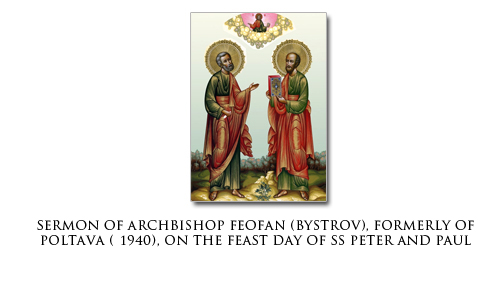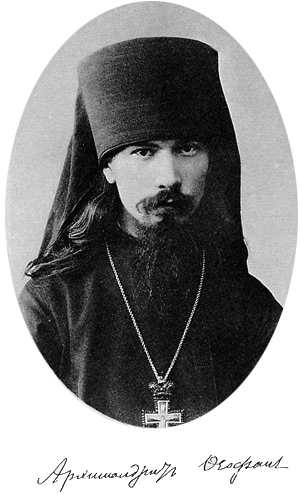
�And I say also unto thee, That thou art Peter, and upon this rock I will build my church;
and the gates of hell shall not prevail against it� (Matthew 16:18).
 These words by the Divine Founder of the Church contain a brief, but very profound teaching of the firmness of the Church of Christ through the end of time. We must examine what this firmness consists of, what it is based on and how we, individual members, can participate in it ourselves. These words by the Divine Founder of the Church contain a brief, but very profound teaching of the firmness of the Church of Christ through the end of time. We must examine what this firmness consists of, what it is based on and how we, individual members, can participate in it ourselves.
To the question How is the Church of Christ firm and indestructible, when some Churches have apparently wavered and been destroyed?, the Eastern Orthodox Catholic Church responds: The Church of Christ is firm in its ecumenical unity. This does not mean that no part, big or small, cannot fall away from unity, but that despite the apostasy of some parts, the One, Holy, Catholic and Apostolic Church always remains, which preserves the pure confession of the faith and the teaching of life, keeps the unblemished Holy Scripture and Holy Tradition, and the unbroken continuity of hierarchy and the Mysteries.
This firmness of the Ecumenical Church depends on the good will of the Father of Heaven through the Holy Spirit by Jesus Christ Himself, Who is the actual foundation and Head of the Church. This is His Body, given life by the Holy Spirit. Apostle Paul writes: �For other foundation can no man lay than that is laid, which is Jesus Christ� (1 Corinthians 3:11). By these words, the Apostle not only recognizes Jesus Christ as the Chief and firm Foundation of the Church, but rejects the possibility of any other foundation. Therefore, Apostle Paul, to whom the words of the Savior were first addressed regarding the establishment of the Church, cannot be the first founder of the Church. He can be, and must be, considered only as a secondary founder of the Church, which was founded on Christ and is firm only in Christ. In this sense, he is not alone as a secondary founder, but is joined by the other Apostles, who surround the cornerstone of Jesus Christ Himself (Ephesians 2:20). Apostle Paul teaches us thus, and the truth of this concept is confirmed by the seer of Mysteries, John the Theologian. The latter, describing the great edifice of the Universal Church of Heaven which appeared to him in a spiritual vision, bears witness to the fact that the wall of this city has at its foundation the names of the Twelve Apostles (Revelations 21:14), and not only Apostle Peter. So the first and main foundation of the Church is Christ the Savior Himself, and this guarantees its firmness.
Thence it becomes clear that how we, individual members of the Church, can become participants in the firmness of the Church.
The Church is firm in Christ because Christ is not simply a man, but God-Man. In Him, mankind is in its existence united, so to speak, anointed by Divinity, and through this the unity has become firm, for the only thing that is firm in and of itself is Divinity. So if we desire to be communicants of this Divine firmness of the Founder of the Church, it is necessary to unify with Him by grace. And this is only possible through utter obedience, in faith and life, to our Mother Church, which, in the words of the Apostle, is the House of the living God and the pillar and ground of the truth (1 Timothy 3:15). �The Apostles,� writes St Irinaeus of Lyon, �fully invested everything relating to the truth into the Church, like a treasury, so that anyone who wishes can partake of it and drink of life� (Against Heresies). And all that is therein is true: it is either in scripture or is preserved in unwritten tradition. �From the dogmas and the sermons of the Church,� says St Basil the Great, �some we have from the teachings which are in scripture, others come to us from Apostolic traditions which we received in mystery. But both have equal force for piety. And no one can deny the latter, if wishes to be at least a little knowledgeable in Church establishments. For if we dare to reject traditions not laid out in the Scriptures, as not having great power, then we unnoticeably distort the most important thing in the Gospel, that is, we would transform preaching into emptiness� (To Amphilochios on the Holy Spirit).
The truth of the Ecumenical Councils is based upon dedication to Apostolic tradition, written and unwritten, �We preserve unharmed all the Church traditions,� say the fathers of the 7th Ecumenical Council in the acts. �We adhere to the ancient legislation of the Catholic Church. We preserve the decisions of the fathers. We anathematize anyone who adds anything to the teachings of the Catholic Church, or takes away from them. Whoever demeans any teaching of the Church, written or unwritten, we anathematize likewise.�
Decisions by the Church on dogmatic questions, once made, were prohibited from being reexamined and changed. �I beseech your holiness,��wrote Bishop Capreol to the fathers of the 3rd Ecumenical Council, �I beseech you that with by the action of the Holy Spirit, Who, without a doubt, will abide in your hearts throughout your acts, will by the power of ancient tradition defeat the new and unheard-of teachings, without touching those which have already rejected by the Church, for under the guise of secondary stud not to renew that which has already been discarded. For if one begins to reexamine decisions already made, it can be justly said of him that he does nothing but doubt the faith which has had effect thus far.� �This is the opinion of us all; we all state the same thing!� replied the fathers of the 3rd Ecumenical Council to the bishop of Carthage.
This is what the Catholic Church teaches. Do we hear her voice and do we heed this call? I will answer with the words of St Gregory the Theologian: �Our works blossomed and flowed well at one time. Then the excessively artful and cunning theological invention had no place in the Divine court, as we see now. To the contrary, to say or hear anything about God that is new and satisfying only one�s curiosity would be the same as to play dice, and by their quick motion to mistake one�s sight, or to entertain an audience with feminine motions of the body. Simplicity and nobility in word were revered as piety. But since philosophy and the thirst for wordcraft, as a grievous and wicked illness, invaded our Churches, idle talk began to be viewed as scholasticism, and as it is written in the Book of Acts about the Athenians, we wish for nothing else but to see and hear something new. Who now will compose our sorrow, as did Jerome, to reflect our sufferings!� The teachings of the Church decided upon long ago are brazenly reconsidered, and no less brazenly are new ones declared! Now we see that �anyone is a theologian, though he may have thousands of blemishes on his soul� (Basil the Great). Our new theologians forget that �no one may speak theology or say any word of God but by the Holy Spirit� (St Nikita the Stylite). �Which things also we speak, not in the words which man's wisdom teacheth, but which the Holy Ghost teacheth; comparing spiritual things with spiritual. But the natural man receiveth not the things of the Spirit of God: for they are foolishness unto him: neither can he know them, because they are spiritually discerned� (1 Corinthians 13-14).
That is why we have no peace. All has been put to disorder and is worsening. And I grieve over this, but also rejoice. I grieve because we have no peace, but I rejoice because peace will come! �And the peace of God, which passeth all understanding, shall keep your hearts and minds through Christ Jesus� (Philippians 4:7); �the God of love and peace shall be with you� (2 Corinthians 13:11). Still, not all peace is to be cherished. For there is wonderful discord, and the most dangerous peace. One must love only good peace, having a good aim and uniting one with God. When there is true impiety, one must hasten to face fire and sword without regard to the demands of the time and of rulers (I dare say not only civil but spiritual leaders), and in fact face anything rather than partake of wicked brew and become infected. The most horrifying of all is to fear anything more than God, for by such fear the servant of truth will betray the teaching of faith and truth!
That is why I am certain that we will also share in good peace. �For it is deemed proper, brethren, that from generation to generation the teachings of His prophets by the Holy Spirit and his friends for the good order of His Church. For if the ancient serpent does not cease to vomit the poison of sin into the ears of man to the peril of their souls, then the Creator puts gladness in our heart (Psalms 4:7), riseth the poor out of the dust (Psalms 113:7), sending to our aid His spiritual sword, which is the word of God (Ephesians 6:17)� (St Nikita the Stylite). May He likewise rise us up!
Like children of obedience, with fervor and love, let us, brethren, take from the mouth of our Mother, the Orthodox Church, the pure teachings of the faith and life, the true grace-filled illumination and true guidance towards the eternal life. Let us flee all false teachers, the �Arabian wolves,� as St Athanasius the Great calls them. Amen.
June 29, 1928, city of Varna.
|